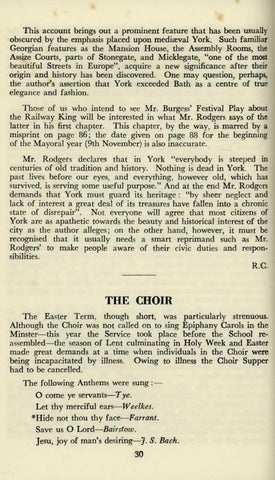This account brings out a prominent feature that has been usually obscured by the emphasis placed upon mediaeval York. Such familiar Georgian features as the Mansion House, the Assembly Rooms, the Assize Courts, parts of Stonegate, and Micklegate, "one of the most beautiful Streets in Europe", acquire a new significance after their origin and history has been discovered. One may question, perhaps, the author's assertion that York exceeded Bath as a centre of true elegance and fashion. Those of us who intend to see Mr. Burgess' Festival Play about the Railway King will be interested in what Mr. Rodgers says of the latter in his first chapter. This chapter, by the way, is marred by a misprint on page 86; the date given on page 88 for the beginning of the Mayoral year (9th November) is also inaccurate. Mr. Rodgers declares that in York "everybody is steeped in centuries of old tradition and history. Nothing is dead in York. The past lives before our eyes, and everything, however old, which has survived, is serving some useful purpose." And at the end Mr. Rodgers demands that York must guard its heritage : "by sheer neglect and lack of interest a great deal of its treasures have fallen into a chronic state of disrepair". Not everyone will agree that most citizens of York are as apathetic towards the beauty and historical interest of the city as the author alleges; on the other hand, however, it must be recognised that it usually needs a smart reprimand such as Mr. Rodgers' to make people aware of their civic duties and responsibilities. R.C.
THE CHOIR The Easter Term, though short, was particularly strenuous. Although the Choir was not called on to sing Epiphany Carols in the Minster—this year the Service took place before the School reassembled—the season of Lent culminating in Holy Week and Easter made great demands at a time when individuals in the Choir were being incapacitated by illness. Owing to illness the Choir Supper had to be cancelled. The following Anthems were sung :O come ye servants—Tye. Let thy merciful ears—Weelkes. *Hide not thou thy face—Farrant. Save us 0 Lord—Bairstow. Jesu, joy of man's desiring—J. S. Bach.
30


























